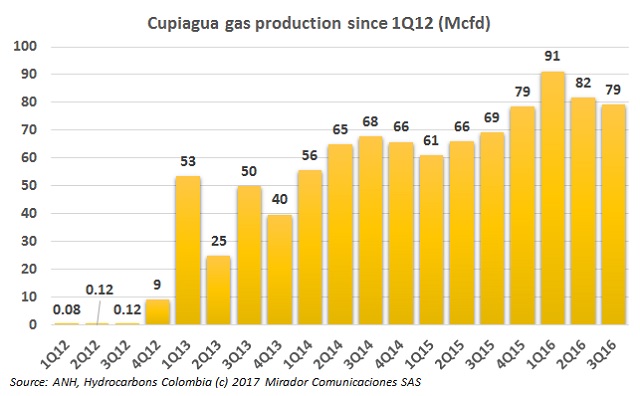Citizens and social leaders of Guamal’s municipality in Meta have called a march for the ‘defense of water and life’ and against the development of oil projects in the area.

GasThe NOC highlighted Cupiagua’s importance to industry and the country. The plant (located in Agauzul, Casanare) initiated operations in December 2012 and has been important for the supply of gas to the domestic and industrial sectors.
The contradictory rulings of Colombian authorities in 2016, have created legal uncertainty in the oil, gas and mining sectors.
Last year at this time I wrote a kind of ‘predictions’ article trying to look ahead into 2016. So I thought in the interests of ‘full disclosure’ that I should check how well I did at predicting how 2016 was going to turn out.

Maybe we should not take MinMinas crude oil production targets too seriously. They are less predictions than wishful thinking to justify budgetary calculations. But we cannot help trying to see if they make any sense whatsoever.
Ecopetrol said attacks halted pumping operations along the 780km Caño-Limon Coveñas (CCL) pipeline, the second most important in the country.
The USO’s major topics of discussion during this week were the ‘labor massacre’ to which workers of the Masa Stork plant will supposedly be put through, legal issues with Naviera Fluvial S.A, corruption and the consequences of Terpel’s so-called fuel monopoly.

The Colombian government failed to meet its oil production target for 2016 (what a surprise). The Ministry of Mines and Energy (MinMinas) reported data for December and the annual average extraction in the country.
German Espinoza was appointed as the new executive president by the Colombian Chamber of Petroleum Goods and Services’ (Campetrol) Board of Directors and will assume office on February 1st, 2017.
The Colombian Petroleum Engineers Association (ACIPET) has a new board and elected Julio Cesar Vera Díaz as the new Chairman. Acipet published an interview with Vera Díaz and we bring a brief summary of it.